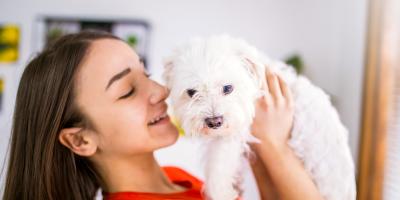Sad Puppy: Signs Your Puppy is Depressed & How to Help


As a pet owner, it can be hard to know if your puppy is sad. Dogs can’t tell us how they’re feeling, so you have to watch for certain cues. Additionally, if you recently adopted your canine companion, you’re still getting to know their general behavior and personality. It may take a little time before you’re able to read their emotions.
That said, a sad puppy may act in ways that are consistent with depression in dogs. Read on to learn about depressed puppy symptoms and how you can help cheer them up.
Can Puppies Get Depressed?
Just like adult dogs, puppies can get depressed. In addition to sadness, puppies can experience basic emotions, such as love, joy, fear and anger. Their emotions are not as complex as those of humans, but they can still affect their mood, behavior and body language.
Do Some Dog Breeds Naturally Look Sad?
While there are puppy depression signs to watch for, some dog breeds have a reputation for looking sad—even if they’re not. For example, wrinkly and droopy dogs, such as the Basset Hound, Bulldog and Bloodhound, can have facial expressions that may be mistaken for sadness.
So, if your puppy seems sad the first day home, remember that, depending on their breed, it may be due to their naturally adorable expression.
Signs of a Depressed Puppy
Assessing puppy depression can be difficult, as some symptoms overlap with signs of other emotions and conditions, such as fear and illness.
If you’re wondering how to know if your puppy is depressed, here are symptoms to watch for:
- Apathetic about their food. A sad puppy may develop a lack of appetite.
- Excessive vocalization. Whining or crying that continues for seemingly no reason could be a sign of depression or distress.
- Lethargy. Pay attention if your pet seems sluggish or lacks interest in physical activity.
- They’re withdrawn. Hiding or avoiding interactions can indicate they don’t want to be around you or others in your household.
Reasons Why Your Puppy Could Be Sad
If your puppy seems depressed, there could be several explanations. To make a determination, consider their symptoms as well as recent circumstances. Here are some common reasons for puppy depression.
Separated From Their Litter
It’s not uncommon for a puppy to be depressed after leaving their litter. If you recently adopted them from a breeder, it could be the first time they’ve been apart from their mother and littermates. Add to this the introduction of a new family and environment; it’s understandable they may feel sad.
Fortunately, puppies often rebound from this experience as they become integrated into their new home. So, if you’re thinking, My new puppy seems sad and tired, it may only be temporary.
They Don’t Like Being Alone
Some puppies experience separation anxiety when left alone. This usually happens when they’re unable to cope with solitude and can result in excessive barking, chewing or accidents in the house.
However, while separation anxiety may seem to be associated with depression, it’s a separate issue. Many dogs who are generally happy can experience feelings of anxiety.
Additionally, your puppy may be sad (but not necessarily anxious) if you’re spending less time at home and are away from them more often. This can also happen when, say, another pet in the home dies.
They’re Sick
If your puppy is feeling sick, they likely aren’t their usual energetic, playful selves. In addition to being sad, they may also need medical attention. If you think your pet may be sick, contact your veterinarian as soon as possible.
How to Cheer Up a Sad Puppy
Knowing how to help a sad puppy is useful if your canine companion seems depressed. Here are some recommendations.
Feed Them a Balanced Diet
Nutrition plays a vital role in your puppy’s development. Feeding your dog a complete and balanced diet of puppy food, given at the appropriate frequency, provides necessary nutrients to support the overall health of your pet.
Provide Physical & Mental Stimulation
Without adequate physical and mental activity, your growing puppy may become depressed. To ensure they get enough stimulation, play games with your puppy, such as “Fetch” or “Find the Toy.”
Enrichment activities can also be useful, especially those that require your young pet to strategize. Puzzle feeders and homemade forts offer opportunities for your puppy to use their brain while having fun.
Give Them Quality Attention
If your new puppy seems sad, make sure to spend time throughout the day bonding with them. Walks and exercise are good opportunities for you to hang out, but bonding doesn’t always have to be active. Snuggle sessions on the couch can be a simple, positive experience if, say, your puppy is sad after leaving the litter. (They can also potentially reduce your own stress levels.)
Establish a Routine
Keep your puppy happy by establishing familiar routines. From feeding to daily walks, stick to a consistent schedule so your dog knows what to expect and when.
Train Your Puppy
Training a puppy improves their behavior but it can also provide structure and reduce stress for them. Additionally, many dogs enjoy approval from their owners. Training provides an opportunity to give them praise, positive reinforcement and of course—treats. If your puppy seems depressed with their collar, remember wearing a collar is a new experience for them. They may need some time to get used to it.
Socialize With Other Dogs
Dogs are social animals, but many of them need to be socialized to enjoy the company of other canines. Socializing your dog entails carefully introducing them to other animals and people so they form positive associations with them. This is a good way to ensure your puppy is able to have safe, happy experiences with your other pets, at the dog park, or just out in public.
When to Seek Help for Your Sad Puppy
If your puppy seems sad all of a sudden, consider possible underlying causes. If they’re recently separated from their litter or are spending more time alone, this could affect their mood.
Also pay attention to their symptoms. Lethargy, refusal to eat or whining a lot more than usual could be signs of a very sad puppy. If these symptoms persist, have your puppy checked by your veterinarian to rule out illness as a possible cause.
For more helpful training insights, check out the myPurina app.
For more expert tips on your dog’s behavior, explore our other puppy behavior articles.
For your own personalized dog training plan, download Zigzag, the most advanced dog training app, for free and unlock 1 month of Premium Access with unlimited lessons, tailored guidance, and 24/7 expert support using code PUR30 at payment.
Install Zigzag for free now to get started

Be Rewarded for Your Purina Purchases
Earn and redeem points for Purina products with myPurina app.






